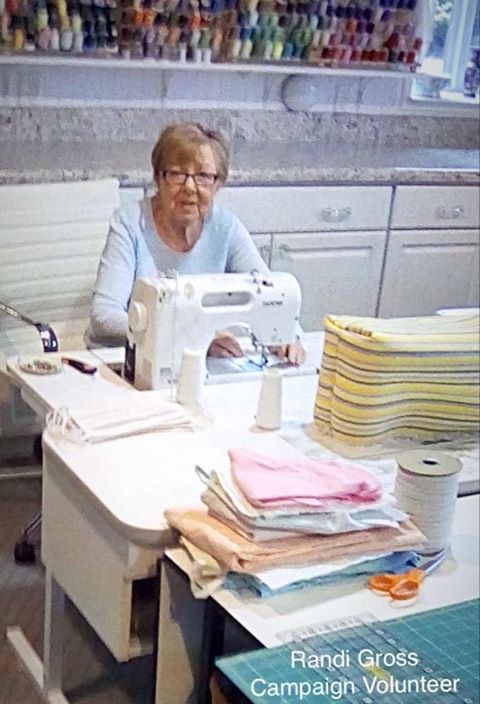
Randi Gross sewing masks for health care workers during the coronavirus pandemic of 2020: Facebook: Randi Mask – Handmade PPE Mask
By Glynn Wilson with Trace Thompson –
LOOKOUT MOUNTAIN, Ala. — One month ago, the president of the United States declared a national emergency because of the coronavirus pandemic, setting off an economic panic. On Easter Weekend, the number of cases and deaths in the U.S. surpassed Italy, with 528,735 confirmed cases and more than 20,543 dead at the time of this writing.
Tracking the novel coronavirus in the U.S.
The dual health and economic crisis has thrown more than 16 million people out of work.
There is also a crisis of democracy across the land. Not only is much of the government and private industry on lockdown, the ongoing system of electing public officials at all levels has been thrown into the fire ring too, making it incredibly difficult for those running for office to figure how to campaign at all with shelter-in-place orders and a prohibition against people gathering in large groups. Big public campaign events are off the table, party headquarters are all but closed down in small towns across the district. That means no more wine, beer and social comradery or large fund raising parties.
On Wednesday, March 18, the day after St. Patrick’s Day, the campaign came to a screeching halt. Volunteers were making phone calls trying to talk to people about the candidate and the race for Congress in November. Neighbors is the Democratic Party nominee running against Robert Aderholt, the Republican who hails from Haleyville, Alabama in Winston County and has held the seat since 1997.
While phone banking, volunteers for the campaign began to notice a trend. Many of the people on the phone list for the largely rural area were older and seemed more interested in talking about the crisis and their families than politics. So as they kept putting together their call list and reaching out, the callers just started finding ways to help people, like their campaign theme, “Neighbors Helping Neighbors.”
“It wasn’t long into the phone banking that the pandemic was upon us when volunteers began sharing their concerns and finding it more and more difficult to campaign politically when public service was in dire need,” said Lisa Ward, the campaign manger. “We began to reassess our objective and it was obvious after realizing 66 percent of the district was rural that we needed to regroup.”
The team decided this was not the time to ask for donations or support.
“Rick agreed we needed to change our priorities and immediately Neighbors Helping Neighbors was more than a campaign theme, it was a movement,” she said. “Our phone banking became Neighbors Checking on Neighbors.”
Neighbors switched from political campaigning to trying to help people, and one of the obvious ideas became finding ways to make and even import the masks needed by the public and especially health care workers.
In an example of what Neighbors himself calls “the goodness of humanity,” he said, people decided to put partisan politics aside and find a way to meet the needs they identified in the community.
“People were afraid,” Neighbors said in an interview. “So they decided we need to fill the need.”
Some of that entailed simply trying to reassure people everything was going to be “OK,” he said.
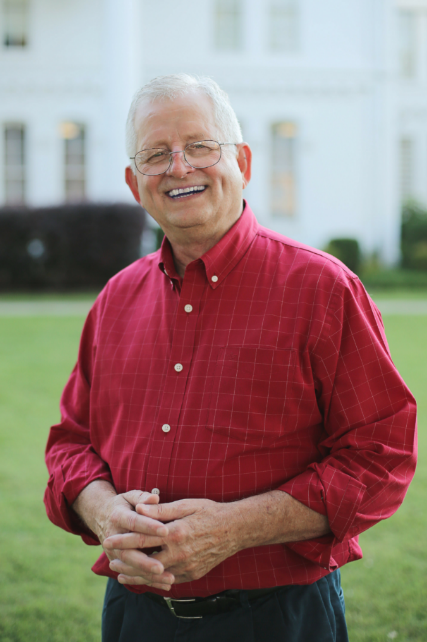
Rick Neighbors, Democratic Candidate for Congress in Alabama’s District 4: Facebook
“We began calling and asking how they were doing, if they needed anything,” Ward said. “We partnered up with students that were sent home from universities who could run errands and make calls and even as seniors got the calls, they became callers themselves. And it turns out some needed a little help, but most were just afraid of the unknown, wanted someone to talk to, felt alone or needed a distraction.
“Next thing we know we have people driving from one side of the district to the other dropping off masks at clinics, homes, fire departments, etc. Masks now called the Randi Mask are on unidentified faces all over the district. Rick, having 35 years in textile manufacturing, reigned in his resources and networked volunteers who provided fabric and elastic. Others had their own stockpiles at home. The masks have been circulating for a month or so when we realized this was getting bigger than us.”
If they needed help, the callers started trying to find someone who could provide that help. During that process the campaign ended up talking to people in health care, and they were told “there are no masks,” Neighbors said. One lady, Randi Gross, said she could do something about that.
“So she started sewing them,” he said. “Then another one said she could too.”
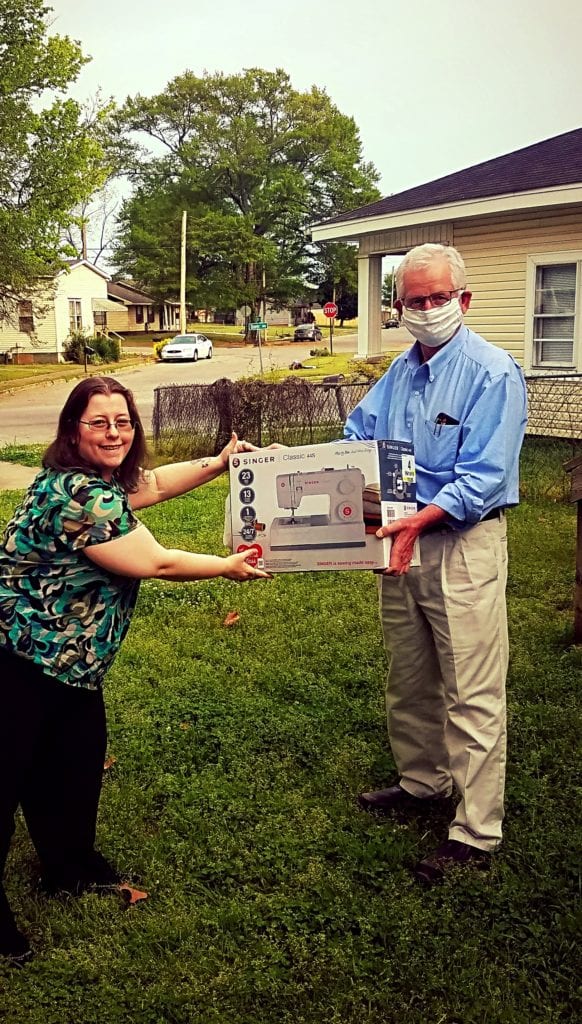
Rick Neighbors, Democratic Candidate for Congress in Alabama’s District 4, buys sewing machines for women who want to help their neighbors by making masks: Facebook
Before long they had a number of people helping out, including Hannah Brown who has sewn hundreds of masks, Ward said.
They also found a local business in Guntersville that had a partnership with a company in China to make suits for sale in Europe, and they were ready to switch their process to make 65,000 to 90,000 masks a week, shipping air freight. But they were held up for a permit with the Food and Drug Administration. So they contacted U.S. Senator Doug Jones, the Birmingham Democrat, and began the process of helping to import the masks the health care workers in Alabama needed, and the Senator responded to the call and helped push through the permit.
“That is truly neighbors helping neighbors,” he said. “That’s how we got through the (Great) Depression. That’s how we got through World War II.”
According to interviews with volunteers, Neighbors went to work creating a business plan reaching out to old networks from here to China putting together a realistic goal to produce 2.5 million masks locally, Ward said.
“The plan is still in the works and hopefully will come to fruition in the next few months,” she said. “While others have been talking about the problem, Rick and the campaign have been working tirelessly trying to bring revenue back to the district by attempting to reopen textile mills, communicating with manufacturers and reconnecting with colleagues in his textile manufacturing past.”
He’s a “three tour vet and businessman who understands what being a real neighbor is,” she said. “This pay it forward mindset was simple. The campaign just began to have the conversations. Neighbors talking to neighbors talking to neighbors.”
To best describe Rick Neighbors, she said, one would have to understand the depth and authenticity of Mr. Fred Rogers of public television fame.
“He emulates the character of that man like no other,” Ward said, quoting Mr. Rogers:
“All of us at some time or other need help. Whether we’re giving OR receiving, each one of us has something valuable to bring to this world,” Rogers said. “That’s one of the things that connects us as neighbors. Because real strength has to do with helping others and the greatest gift you ever give is your honest self.”
Ward pointed out that most of the time the people doing the most to help people around them never make it into the news.
The greatest campaign lessons from the experience so far, she said, are two things.
“People just want someone to listen. They want to be heard,” she said. “They want us to tell them the truth.”
Wrangler Jeans
Neighbors’ work experience is in manufacturing, specifically in the garment industry, starting out many years back with Wrangler Jeans, which were made in America. He knows the term for the custom Wrangler stride, the front and back rise the jeans are known for because they were designed for bull riders. Many people like them because they are less likely to create that dreaded butt crack cleavage when you bend over. They were designed for “comfort,” he said. “Less painful.”
Cowboys “needed more space at thigh,” he said. “And when bucked backwards, they needed more fabric so sensitive parts would not be squeezed.”
Ouch.
The bottom line is he saw the crisis and the response through the eyes of a “manufacturing guy,” he said. “You fight the enemy that is in front of you.”
He also knows something about battles, since he’s a Vietnam Army vet himself.
“The people in the battle don’t have the protective gear they need,” he said.
That is a tactical solution, he points out, not a strategic solution, “and it’s not sustainable in the long-term. We have to create the processes to support our population.”
The Neighbors campaign also found a local plant that was closed down they thought might could be reopened and refitted, potentially turning out 1.5 million masks a week, “if someone would make the investment,” he said.
“There is no reason for us to have these shortages and have these peoples’ lives in jeopardy because we have leaders without vision,” he said. “Leaders who are serving themselves and not the community.”
What’s needed is a long-term strategic solution, which he says would be an industrial board to provide incentives for companies to rebuild the factories in this state and country, something he could help to create if he is elected to Congress.
The district he could represent is the result of Republican gerrymandering, and sprawls from Russellville near the Mississippi state line on the west and Lookout Mountain on the Georgia line to the east, Tuscaloosa in the south to Jackson in the northeast.
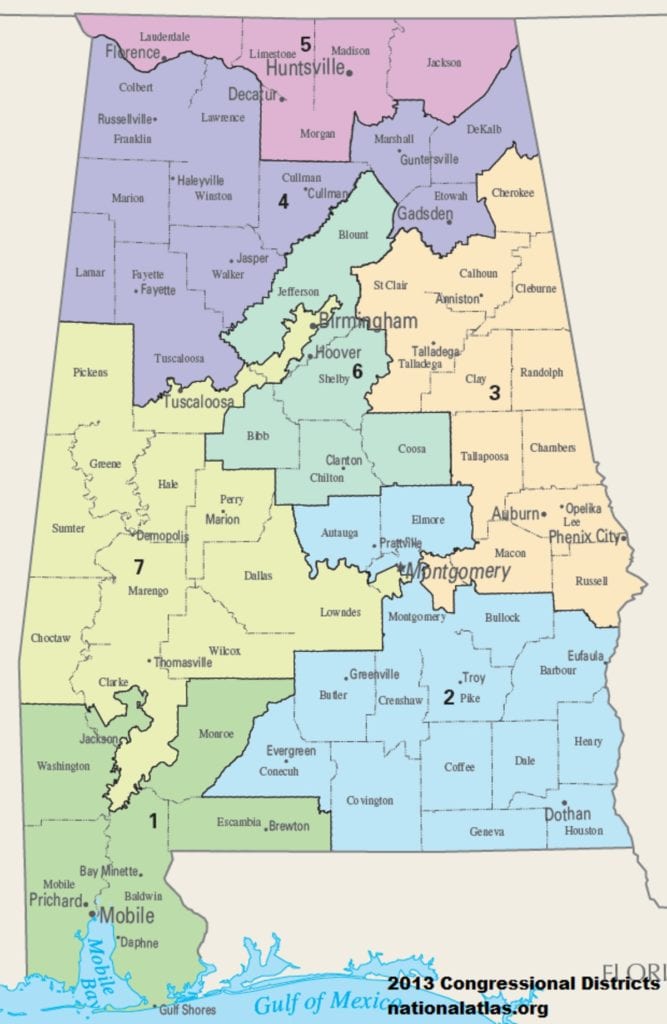
It includes 11 counties, Colbert, Lawrence, Marion, Winston, Lamar, Fayette, Walker, Cullman, Marshall, Etowah, DeKalb and parts of Tuscaloosa County, as well as the cities of Sheffield, Tuscumbia, Muscle Shoals, Jasper, Cullman, Albertville, Gadsden, Guntersville and Fort Payne.
Why Is He Running?
So why did Rick Neighbors, a kid from a share cropper farm, decide to run for political office in the first place? He first decided to run for the seat in 2018, but did not win the Democratic Party’s primary. This spring, he ran unopposed and became the nominee.
“It’s always been an interest of mine,” he said, since he studied Political Science and Government at the University of North Carolina in the late 1970s.
“I grew up believing in the idea of America, that we can make the world better by the decisions we make,” he said.
He remembers living on a farm during the Civil Rights era and working alongside black farmers, getting to know them well.
“Sometimes they would come over and help us, and we would go help them,” he said. “That’s just the way we grew up.”
When the Greensboro sit-ins started happening at the Woolworth department stores in 1960, he said, there was social pressure to fight against the black race, but not the local farmer they called “Mr. Joe.” As a young teenager at the time, he asked those white farmers who wanted to oppose equal rights, “What about Mr. Joe?”
He was told, “Oh, he’s not one of them.”
“I realized very quickly we hated people we didn’t know,” he said. “But the people we knew, they were OK. I remembered that lesson.”
He also got to know an African American Sergeant Carter in the Marine Corps who influenced him on equal rights, even though since he was black, he could not come out on deck on the ship in the war out in the Pacific Ocean in daylight.
“They were segregated,” he said.
He was mentored by the sergeant in 1967 whose mission was to train good non-commissioned officers who come up through the ranks.
“It didn’t matter the color of their skin. His job was to train leaders,” he said. “That’s now part of the core of who I am.”
What got him involved in this race against Rep. Aderholt, he said, goes back to 2010.
People in this district were and still are struggling in jobs with wages of $10 an hour, he said.
In 2010, a man offered to open a local factory to make light bulbs and pay higher wages, but he needed to raise $20 million to open the plant. So Neighbors got to work on a business plan and called his Representative in Congress, Robert Aderholt, thinking all the Congressman would have to do is make a phone call.
“He did not make that phone call, and a year later they built that factory in Ohio,” Neighbors said. “Quite frankly that pissed me off.”
His proposal included about 400 jobs with wages of $20 an hour.
Aderholt has been running and winning every two years with little opposition since first taking the seat in 1997 after the retirement of Democrat Tom Bevill.
“The people in this district are still making subsistence wages and we consider that normal, and I say it is not normal,” Neighbors said. “We’ve created this situation because of the laws that we’ve passed. The wealth does not go to the people who create it.”
That $10 an hour in 1980 was equivalent to $67,000 today, he said, a middle class living wage back then.
“Now you have college grads out there who, if they are lucky, may find something in the low fifties. Back then the people who made the products could have a middle income job. Now that has shifted,” he said, “And the people suffer.”
So he is running for Congress to show up and do the job to provide good paying jobs for the people in North Alabama, to find a way to pay for health care for everyone, the job he says Aderholt is not doing.
“Not only do I think he’s not doing it, he’s not doing it,” Neighbors said in a telephone interview.
When I asked what he is doing, he said: He’s “getting reelected.”
“This virus has brought up the weaknesses in the whole concept of globalization and comparative advance,” Neighbors said. “It’s also broght up a weakness in the for-profit medical care system.”
He wants to help lead a public conversation about those things during the campaign over the next six months, once the coronavirus comes under control and the death curve turns down.
“Let’s build a nation that works for all people and not just a few,” he said. “If you want to change the direction we are going, you have to elect different people.”
More Photos
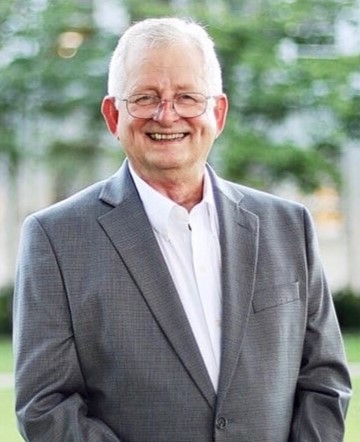
Rick Neighbors is running for Congress: Facebook
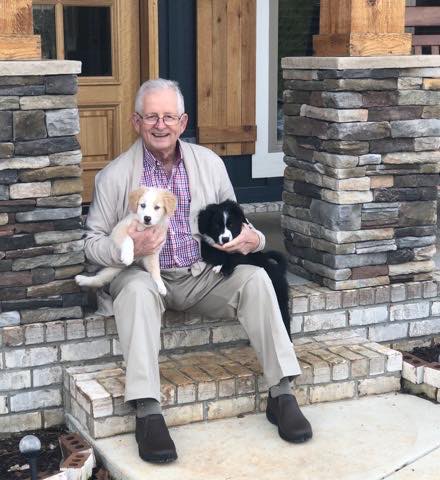
Rick Neighbors is a dog lover: Facebook
—
Glynn Wilson is a veteran news writer originally from Birmingham, Alabama. Trace Thompson is a second-semester freshman from Winston County studying journalism and Political Science at the University of Alabama, now taking classes from home over the internet due to the coronavirus pandemic.














I am totally behind the Neighbors Helping Neighbors movement, it’s what Alabama has needed a long time, basic solidarity for mutual survival and social progress.
A hopeful message for all Americans…thanks!
Hope is what we need, this is an example of mankind’s goodness in dark times.
Good luck Rick Neighbors! You are a true American and a decent human being.
It’s takes a community to help a community. I LOVE their campaign motto, “Neighbors Helping Neighbors,” it is this kind of mindset that will set our society apart from the past. Let’s move into a brighter and more hopeful future with giving hearts and making REAL change.
In an age of it’s “us” verses “them”-this is most refreshing. Maybe now we can transition from ‘all for one’ to ‘one for all’ without making demons out of anyone who dare disagree with ‘us’ (i.e. our radical conservative friends)… Jesus reminded us that the absolute best way to destroy your enemy is to become friends with them and, let us remember, The Golden Rules is NOT ‘he who has the gold makes the rules’ BUT ‘do unto others as you would have them do unto you’-somehow collectively we have forgotten that. This campaign of honesty and decency provides hope-finally! (Rick-6th Special Ops, search & rescue 68-69, after the campaign, lets talk?)